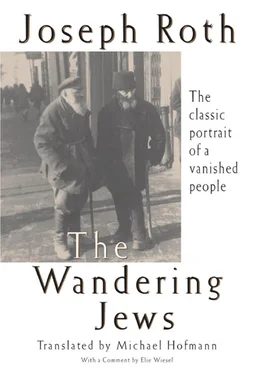Many believe in him. He himself, the rabbi, does not distinguish between the most faithful followers of the Scriptures and the somewhat less faithful ones, no, nor even between Jew and goy or man and beast. Whoever comes to him is assured of getting his help. He knows more than he is permitted to say. He knows that there is another world above this one, which is differently constituted, and he may even sense that certain commands and interdictions that make sense in this world are of no consequence in the other. What matters to him is following these unwritten, but all the more valid, laws.
People lay siege to his house. It is larger, brighter, wider than Jewish dwellings generally are. Some wonder-rabbis really do hold court. Their wives wear exquisite dresses and have servants; they own horses and stables — not for the enjoyment of them, mind, but in order to represent.
IT WAS on a day in late autumn that I set out to call on the rabbi. A day in late autumn in the East, still warm, full of humility and a golden forbearance. I got up at five in the morning. The cold damp fogs were lifting, and visible shivers passed over the backs of the patient horses. Five Jewish women sat in the farm cart with me. They wore black woolen cloths and looked older than their years. A hard life had marked their bodies and their faces. They were traders, bringing poultry to the houses of the well-to-do and living off their slender profits. All of them had their young children with them. With whom could they have left them anyway, on a day when the whole world was off to see the rabbi?
We reached the small town where the rabbi lived just as day was breaking, and we saw that many people were there ahead of us. These people had been there sometimes for days already, sleeping in passageways, in barns, in haylofts. The local Jews were doing good business, renting out places to sleep for money. The large inn was overcrowded. The street was uneven, rotten fence planks stood in for pavements, and squatting on the planks were the people.
I had on a short fur coat and high riding boots. I no doubt looked like one of the feared local officials, a signal from whom was enough to get someone thrown into prison. Therefore people let me pass. They moved aside for me and were surprised that I thanked them. Outside the rabbi’s house stood a red-haired Jew, the master of ceremonies, beset on all sides with pleading and cursing, with nudges and with banknotes, a man of influence who knew no mercy. He repelled the imploring and the scolding alike with a kind of measured roughness. Indeed, it sometimes happened that he took money from some people and then didn’t admit them, that he forgot who had given him money or affected to have forgotten it. His face was waxy white and shaded by a round black velvet hat. His copper-colored beard jutted into people’s faces in disorderly tufts, in places it had worn out like an old lining, and where it did have a showing, it grew as it pleased, not subject to the design that nature has planned for the run of beards. The Jew had small yellow eyes under very thin, scarcely visible eyebrows; broad strong jaws that suggested an admixture of Slavic blood; and pale, bluish lips. When he shouted I saw his strong yellow teeth, and when he pushed someone away, I saw his powerful hand, sprinkled with red hairs.
I gave the man a signal I thought he’d understand. It meant: Here is something rather out of the ordinary, something we need to talk about in private. He vanished. He slammed the door, locked it, and, parting the crowds, came up to me.
“I’m not from here, I’ve come from afar, and I would like to speak to the rabbi. Only I’m not able to give you much money.”
“If someone is sick, or you want a prayer said for his cure, or if you’re poorly yourself, then write down on a piece of paper what it is you want, and the rabbi will read it and say a prayer for you!”
“No, I must see him!”
“Can you come back after the holidays?”
“I’m afraid I can’t. I must see him today!”
“In that case, I can’t help you.You’d better go through the kitchen!”
“Where is the kitchen?”
“Around the other side.”
“Around the other side” there was a gentleman waiting who had evidently paid out a lot of money. He was a gentleman, in every respect a gentleman. You could tell that by his girth, his fur coat, and the expression of his eyes, which were not looking for anything to look at and had not found anything. He knew exactly that the kitchen door would open in five minutes, ten at the latest.
But when the door did open, the rich gentleman turned rather pale. We walked along a dark passageway that had an uneven floor, and the gentleman struck matches and still walked a little apprehensively.
He was with the rabbi for a long time, and came out in a high good humor. I heard later that the gentleman had the sensible habit of going to see the rabbi by the kitchen route every year, that he was a rich naphtha merchant and mine owner, and that he scattered so much money among the poor that he was allowed to duck out of many of his obligations without needing to fear a fine.
The rabbi sat in a plain room, at a small table in front of a window that looked out over a courtyard, with his left elbow resting on the table. He had black hair, a short black beard, and gray eyes. His nose jutted powerfully from his face, as though on a sudden impulse, widening and flattening a little at the tip. The rabbi’s hands were bony and thin, and his fingers had sharp white nails.
He asked in a clear voice what I had come about, cast a quick look in my direction, and then gazed out into the courtyard again.
I replied that I had heard much about his wisdom and had wanted to meet him.
“God is wise!” he said, and looked at me again.
He beckoned to me to come to the table, shook my hand, and, with the heartfelt tone of an old friend, bade me: “Farewell!”
I left the same way I had come. In the kitchen the red-haired man was hurriedly eating a bowl of bean soup with a wooden spoon. I gave him a banknote. He took it in his left hand, continuing to ply his spoon with his right.
Outside he caught up with me. He wanted to hear what news I had, wondered whether the Japanese were once again preparing for war.†
We talked about wars and about Europe. He said: “I have heard that the Japanese are not goyim like the Europeans. Why then are they making war?”
Any Japanese, I think, would have had difficulty answering his question.
I SAW that there were many red-haired Jews living in the little town. A few weeks later they celebrated the Feast of the Torah, and I watched them dance. It wasn’t the dance of a degenerate race. It was more than the energy given by a fanatical faith. It was a kind of health that took the occasion to break out into religion.
The hasidim took each other by the hand, they danced in a ring, broke up the ring and clapped their hands, they tossed their heads left and right in time to the music, they picked up their Torah scrolls and swung them around like partners, clasped them to their bosom, and kissed them and shed tears of joy. There was eroticism in their dance. It moved me deeply to see a whole people that didn’t separate physical cravings from spiritual joys but united them, consecrating its sensual pleasure to its God, making the book that contained its strictest laws into a beloved. There was fervor and ardor together, dancing as a form of worship, an orgy of prayer.
The people drank mead from great tankards. Who is responsible for the lie that Jews don’t drink? It’s the expression, half admiring, half reproachful, of suspicion of a people who are accused of being unremittingly conscious. But I saw Jews losing consciousness, admittedly not after three pints of beer but after five tankards of strong mead, and not on the anniversary of a battle but out of joy that God had chosen to share his knowledge and his law with them.
Читать дальше












